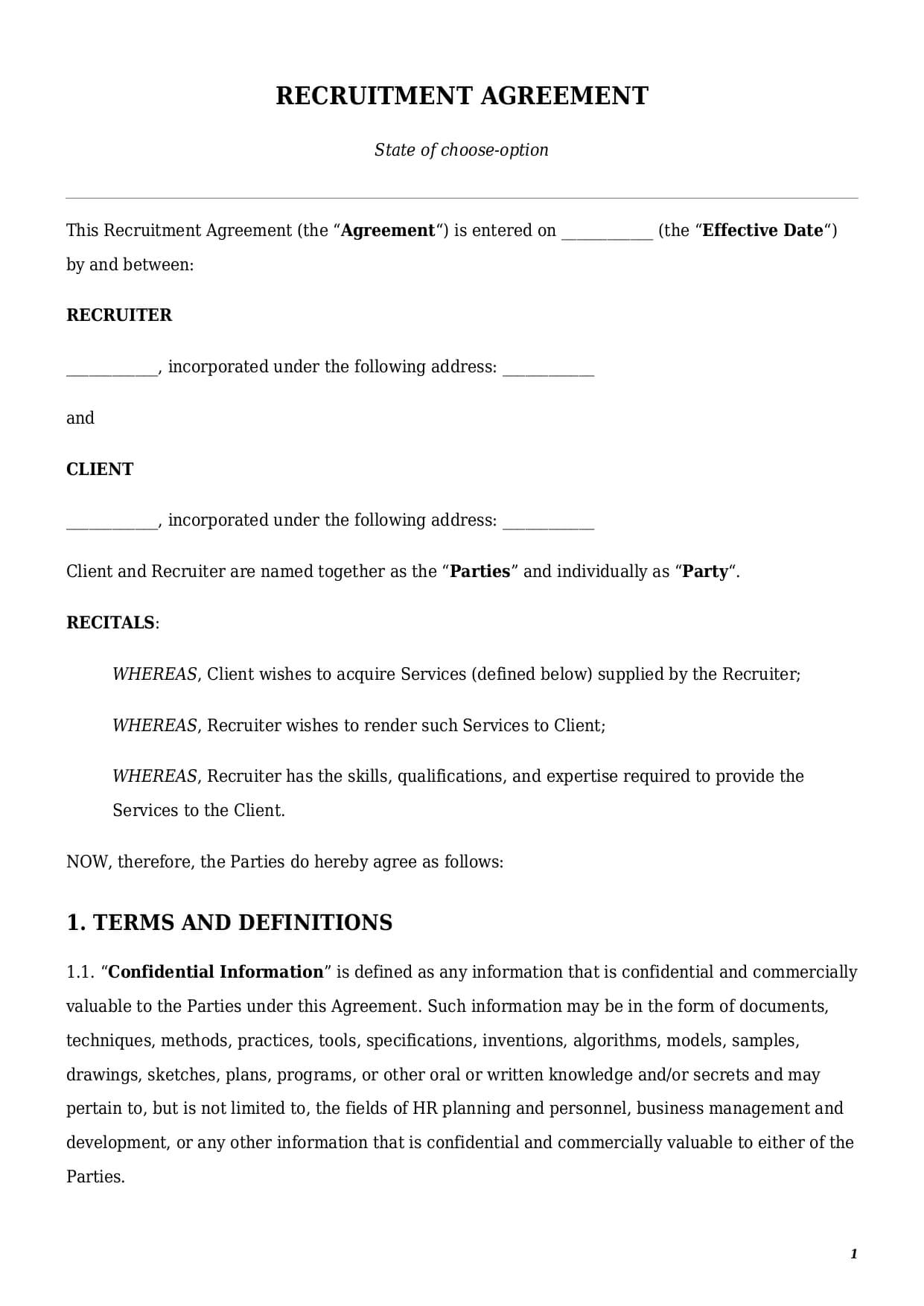Recruitment Agreement
Reviews


What is a recruiter agreement?
A recruitment agreement is a formal legal contract between an employer and a recruitment agency that defines terms and conditions for the search, selection process, and approval of candidates for an employer’s business. This contract establishes transparency between parties, as well as ensures clarity regarding the following:
- scope of services requested;
- requirements for candidates’ qualifications and skills;
- post-hiring obligations of parties;
- payment terms;
- termination; and
- confidentiality.
A recruitment agreement USA template typically involves two parties who are a client and a recruiter. A client is usually an employer who searches for a suitable candidate or candidates for their business. An employer could be an individual, business, or organization.
Another party to a contract is a recruiter, who could be a professional recruitment firm or agency. In some cases a recruiter could be an individual. This is the reason why the present contract is also being referred to as a freelance recruiter agreement.
While a recruiter should possess good skills and expertise to be able to seek for talents, the recruitment business within the United States does not require any specific licensing or certification.
How to draft a recruitment agreement template?
Drafting a recruitment agreement template might be a daunting task, as it requires a lot of attention to detail. Below we made a breakdown of the most essential sections a good recruiter contract should have to become a legally enforceable document.
Description of Candidates Needed
One of the foundational elements of any recruitment agreement format is a detailed description of the type of candidates required. An employer shall have to provide as many details as possible to help recruiters to narrow their search.
Amongst typical requirements an employer should address in the text of a contract are a minimum number of years of experience, level of education, specific certifications or licenses, and salary range.
It is also common for an employer to narrow the recruitment process by the limitations below:
- visa requirements or citizenship;
- clean criminal record;
- fluency in Spanish and English, etc.
Replacement Guarantee Clause for Candidates
Most standard recruitment agency agreement templates include a replacement guarantee clause. This clause ensures that a recruiter has to replace for free a candidate if such a candidate resigns from an offered position within a certain period of time.
There are a number of important considerations that parties have to discuss further when drafting a guarantee clause:
- First, how many rounds of replacement should a recruiter be able to offer? One, two, or more?
- Second, shall the termination of an employment contract by a client be covered by a guarantee clause?
- Third, what should be the duration of a guarantee period? 30, 60, or more days?
A replacement guarantee clause is closely connected to other provisions of a recruitment agreement, including a recruiter’s fee. Some recruitment agreement templates may subject a payment of a recruiter’s commission to a candidate’s successful passing a probation period or other circumstances.
Exclusivity vs. Non-Exclusivity of Relations
It is common for the parties to a recruitment agency contract agreement to define whether their relations should remain exclusive or non-exclusive.
Under an exclusive recruiter contract, a recruiter should remain a one-stop shop for all external recruitment services an employer may need. In other words, an employer should refrain from hiring other third-party recruitment agencies to search for suitable candidates and their further recruitment. An exclusivity clause, however, does not limit an employer from making an internal hiring and search of candidates.
A non-exclusive recruitment agreement allows an employer to contract several different recruitment agencies at the same time. This is usually done to maximize the search results of suitable candidates, especially when time is of the essence for an employer.
Fees Involved
A well-drafted recruitment agency contract agreement should include payment terms defining a recruiter’s remuneration and payment deadlines. The fee structure under this type of services contract could be as follows:
- a fixed fee;
- a fixed commission (usually calculated as a percentage from a candidate’s annual gross or net salary);
- a fixed fee plus commission; or
- other arrangements.
As a rule of thumb, a client has to pay a recruiter’s fees in full once a successful candidate has been found and approved. However, parties may agree upon other payment deadlines. For example, a client may pay a small fixed fee at the start of the contract and, if a candidate is found, a commission at the end of the contract.
Termination
A recruitment agency agreement automatically ends once a successful candidate(s) is found and approved by an employer. However, either party should have the right to terminate a contract in circumstances other than failure to find a suitable candidate.
Therefore, a good recruitment agreement template should include the clauses below:
- automatic termination of the contract in case of either party’s inability to perform their duties (e.g., death, bankruptcy);
- material breach of contract’s provisions by either party;
- termination without cause by serving a prior written notice (a notice period could be 5, 15, 30, or more days).
How to customize a recruitment agreement template at Faster Draft?
In order to personalize your document, follow a few easy steps below:
- Click the button “Create Document.”
- Answer simple questions in the questionnaire.
- Select a document’s format—recruitment agreement PDF.
- Make a payment.
- Download a customized printable document in seconds.
Table of content
Frequently Asked Questions (FAQ)
-
1. What is the difference between an employment agreement and a recruitment agreement?
These two legal documents represent different stages of an employment process within an organization.
A recruitment agreement helps employers to find a suitable candidate by ordering services and help from a professional recruiter or recruiting agency. Once a suitable candidate is found and approved by a potential employer, the next stage is to start employment relations.
An employment agreement is a legal document between a candidate (i.e., an employee) and employer that defines terms and conditions of employment relations, including job duties, salaries, probation periods, etc.
-
2. What are the requirements for a recruitment agreement format?
Neither federal nor state laws define the exact structure or list of clauses a recruitment agreement should have. Therefore, parties may decide on their own which clauses to include in the text of a future contract.
Since a recruitment agreement is a special type of services contract, it would include general provisions about duration and termination, party details, and payment terms.
At the same time, considering a recruiter contract’s specific legal nature, parties may wish to include additional information. Firstly, a confidentiality clause may protect disclosure of any sensitive information exchange between the parties during their cooperation. For instance, a remuneration offered to a successful candidate or a list of additional benefits.
Secondly, parties may also wish to discuss the exclusivity of their relations. This is when an employer may not need to hire any other recruitment agency or HR professional dealing with a personnel search for an employer.
Finally, employer may need to perform additional recruiter services, including professional testing of successful candidates, assistance in visa application, or performance of drug tests.

Looking for something Different?
Start typing to find out our collection of legal documents and contract templates
